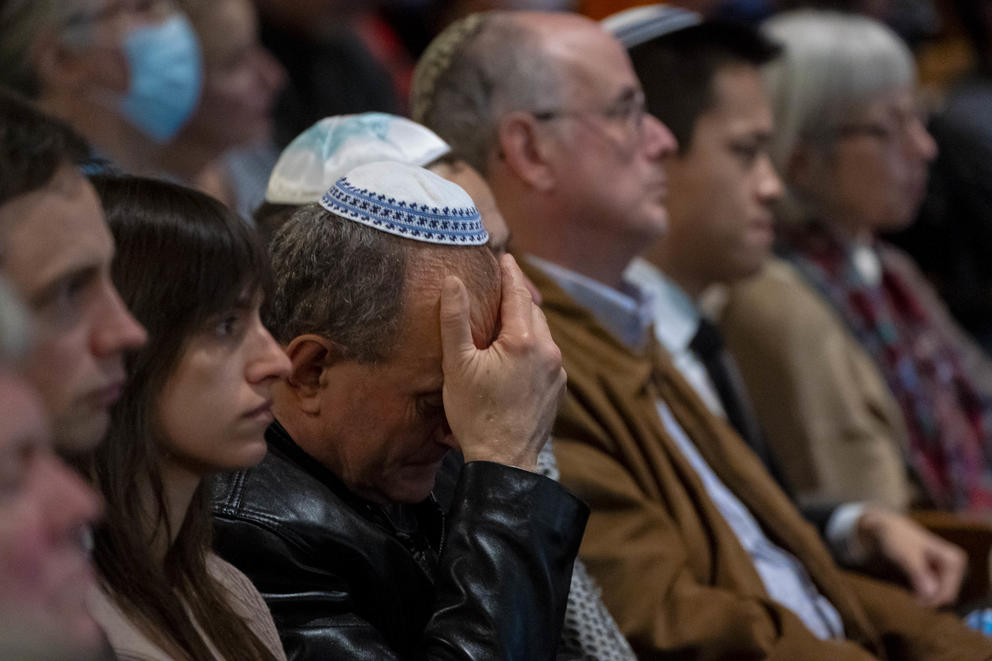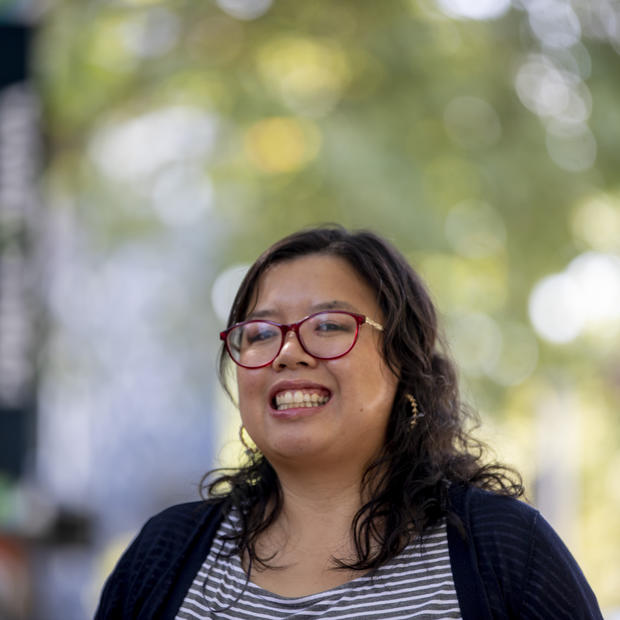“It’s very important to emphasize all reasonable people want the violence to stop and that every human life has value, whether Palestinian or Israeli,” said Katie Walker, spokeswoman for the Washington chapter of the Council on American-Islamic Relations, or CAIR-WA.
Local law enforcement is well aware of those concerns and say they are prepared to respond to ensure safety and security for Jewish and Muslim communities, including while individuals exercise their First Amendment rights during demonstrations and rallies.
According to the FBI, two of the highest categories of hate crimes in Washington are already those targeting Muslims and Jews, with 16 incidents against Muslims and 13 against Jews out of 576 reported hate crimes in Washington in 2021. Attacks based on race and sexual orientation are the top two categories of hate crimes in Washington; religion is third.
During a Jewish community vigil on Tuesday at Seattle’s Temple De Hirsch Sinai, Lt. Gov. Denny Heck shared how he thanked security guards as he entered the building for keeping everyone safe during the event.
“But security for a house of worship, a most sacred of place? It shouldn’t be necessary,” he said. “But we know it is. You have known it since before this weekend. You knew it before the tragedy at the Tree of Life [synagogue] five years ago. You have known it for a long period of time.”
Heck was referring to the 2018 shooting at a Pittsburgh synagogue. And Seattle’s Jewish community is no stranger to violence: In July 2006, one person was killed and five others were injured after Naveed Haq, a Tri-Cities resident of Pakistani descent, opened fire inside the Jewish Federation of Greater Seattle. Haq, who railed against Jews and U.S.-Israel policies during the shooting, received a life sentence in 2010.
Now security concerns among Jewish residents of Puget Sound – and throughout the U.S. – are high again following a surprise attack on Israel by the Palestinian militant group Hamas that has left nearly 1,200 people dead. An estimated 1,400 people in Gaza have died in Israel’s reprisals after the Hamas attack, according to The Associated Press.
On Friday, Jewish organizations, synagogues and schools were on high alert after receiving word that former Hamas leader Khaled Meshaal called for global Muslim protests on that day and urged other neighboring countries to join Palestine in fighting Israel.
But even before Meshaal’s call, many Jewish organizations and places of worship began increasing security around their buildings. Many have improved security using grants from the federal government from a program started in 2004 after the Jewish Federations of North America urged Congress to support the security needs of nonprofits to prevent terrorist or extremist attacks. While the program was established at the urging of U.S. Jewish communities, many non-Jewish nonprofits have received grants since the program’s inception.
On Monday, the Jewish Federation of Greater Seattle emailed updates on what is happening in Israel and outlined comprehensive security measures Jewish institutions should implement.
“This is part of the normal operating procedures of every Jewish organization in the country,” said Max Patashnik, director of government affairs for the Seattle organization.
Personal ties
The United States is home to about 40% of the world Jewish population – the highest outside of Israel. Many American Jews have family and friends who live in Israel, and may have heard of family and friends who were killed, injured or held hostage during the Oct. 7 attack by Hamas.
That was highlighted during Tuesday’s vigil for the Jewish community in Seattle.
During her remarks, Sen. Maria Cantwell mentioned Hayim Katsman, a University of Washington graduate, one of the U.S. citizens who died during Hamas’ attack on Israel. Katsman had researched the interrelations of religion and politics in Israel and Palestine and earned his Ph.D. from the University of Washington in 2021.
Colleagues and professors at the University noted Katsman’s ability to communicate on complex issues and his dedication to peace and solidarity; one also mentioned that he dedicated his dissertation to “all life forms that exist between the Jordan River and the Mediterranean Sea.”
May Brown, an Israeli in Seattle as an emissary, shared the story of a former colleague and friend who was among the 260 people killed at a music festival, and two others, including a former student and friend, who managed to escape after great uncertainty they would emerge alive. “I’m here to give them a voice tonight, to tell their story.”
Near the end of the vigil, Rabbi Daniel Weiner asked those who were Israeli, or served in the Israel Defense Forces, or who had family in Israel or family serving in the IDF, to stand. About a third of the audience stood, said Patashnik, who helped organize the vigil.
“I think that was one visual demonstration of how traumatizing [the attack on Israel] is for so many in the Jewish community,” she said.
Pushing for justice
Muslims in Washington state are also voicing safety concerns — both for Palestinians abroad and Muslims in the U.S.
“Any heightened events around the globe can lead to increased Islamophobia or attacks,” said Walker, the CAIR-WA spokeswoman. “Muslims and Muslim communities are keeping an eye out for anything that is occurring. Of course, people are concerned for loved ones in and near Palestine.”
Walker also said it’s important to note the underlying cause of violence and conflict in the region, namely the “decades-long occupation of Palestine by Israel and the denial of Palestinian rights.”
Indeed, throughout Puget Sound, several events have centered on the plight of Palestinians in the Gaza Strip and pushed for the liberation of people there.
She added, however, it’s important not to pit Muslim and Jewish communities against each other. “Only justice is going to allow peace to happen in a land that so many people hold dear,” Walker said.
Seeing the view among some participants in protests and rallies — that Hamas was justified in killing Israeli civilians — is painful, said Patashnik of the Jewish Federation of Greater Seattle.
She said that people voicing concerns about safety or processing the trauma of losing family and friends in Israel doesn’t mean they don’t care about the plight of Palestinians or agree with the actions of the Israeli government.
“It’s hard to explain to people the trauma [of the attack] and that just because you’re Jewish and just because the state of Israel has the right to exist, doesn’t mean you don’t want peace or don’t want a Palestinian state,” she said.
Noam Pianko, a professor and Jewish historian at the University of Washington’s Jackson School of International Studies, said that while Jewish people in the U.S. generally are feeling horrified by what they see as new and unexpected violence on their global community, views will differ on how Israel should respond to this latest act of violence or how to fix the decades-long conflict between Israel and Palestine.
Even before this attack, he said, there was growing polarization of views on Israel among the American Jewish population. And those differences will emerge in the weeks and months to come as the war plays out and more civilians in Israel and Gaza die.
“It really depends how you frame the response to this unprecedented attack — this killing of 1,000 Jews,” he said. “What kind of response does that justify?” he said.
Law enforcement response
Meanwhile, law enforcement agencies throughout Puget Sound say they are prepared to respond to any incidents to protect both Jewish and Muslim communities.
“Since Saturday, we have proactively informed precincts about all synagogues and mosques, instructing them to conduct extra patrols,” the Seattle Police Department said in a written statement. “To ensure the safety of the Jewish community, we are actively collaborating with various Jewish organizations to address any potential concerns.”
Seattle Police was present at Tuesday’s vigil at Temple De Hirsch Sinai, and police around the region have committed to being present at religious services this weekend.
Meanwhile, the Kirkland Police Department said in a written statement that officers were able to – for the most part – maintain peace and safety during Sunday’s demonstration in downtown Kirkland by both pro-Palestine and pro-Israel supporters. Tension between the two groups prompted officers to discharge a bio-irritant to maintain a space separating them, but there were no injuries. Officers also talked to both groups until the event ended and the roughly 300 participants left the park.
There were no issues at Monday’s rally in Bellevue in support of Israel, which attracted about 500 people, said Major Alycia McKinney of the Bellevue Police Department.
McKinney said the department has been prepared for such demonstrations, and officers have “specific tactics” to ensure safety so that demonstrators with all viewpoints can express them according to their First Amendment rights. Bellevue Police is in regular contact with both the Muslim and Jewish communities in the city, she said.
Sharing others' pain
Patashnik said she’s seen other faith communities eager to connect to provide support as well as to start dialogue on what’s happening abroad.
She said the thought is appreciated, but she’s encouraging Jewish community leaders to wait a few weeks to work through their feelings first.
Patashnik expects past and ongoing interfaith efforts will be significant in the coming weeks and months.
CAIR-WA has participated in interfaith efforts, such as one earlier this year updating mental health issues among those in the Gaza Strip and featuring a discussion on navigating social divisions globally and locally. The event was co-sponsored by several faith organizations.
“I think it just strengthens interfaith work when we come together around big issues and events,” CAIR-WA’s Walker said.
Ilyas Mohammed, president of the Islamic Society of Southwest Washington in Vancouver, said he is concerned about the safety of Muslims but knows he can lean on the relationships the Islamic Society has with other groups, including the Jewish community.
Mohammed said that both Muslims and Jews can share in the pain, anguish and suffering that innocent Jews and Palestinians face daily due to the decades-long conflict. And he said when needed, he and others at the Islamic Society of Southwest Washington will be there to provide support for Jewish people in Vancouver.
“We can feel each other’s pain,” he said.



















